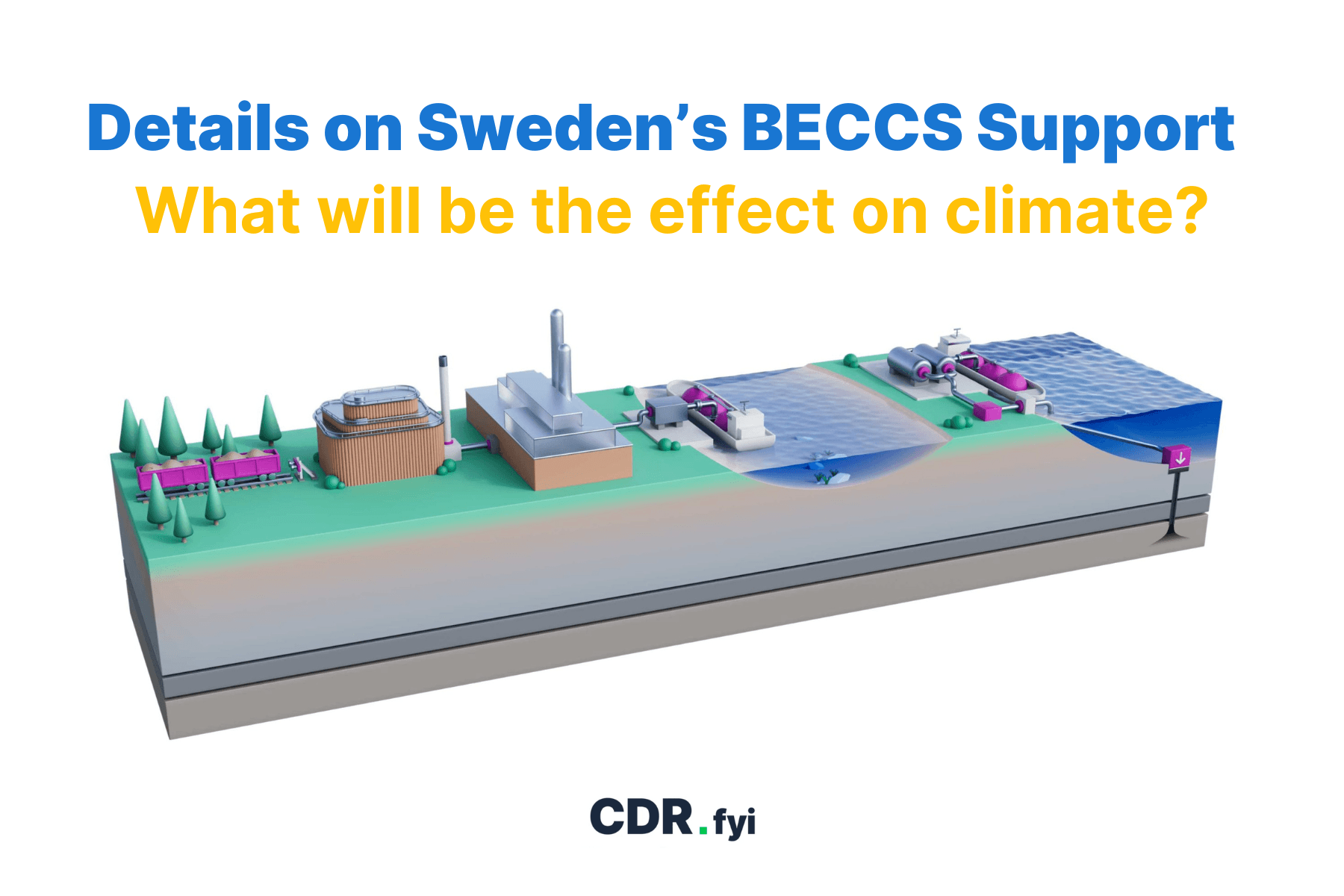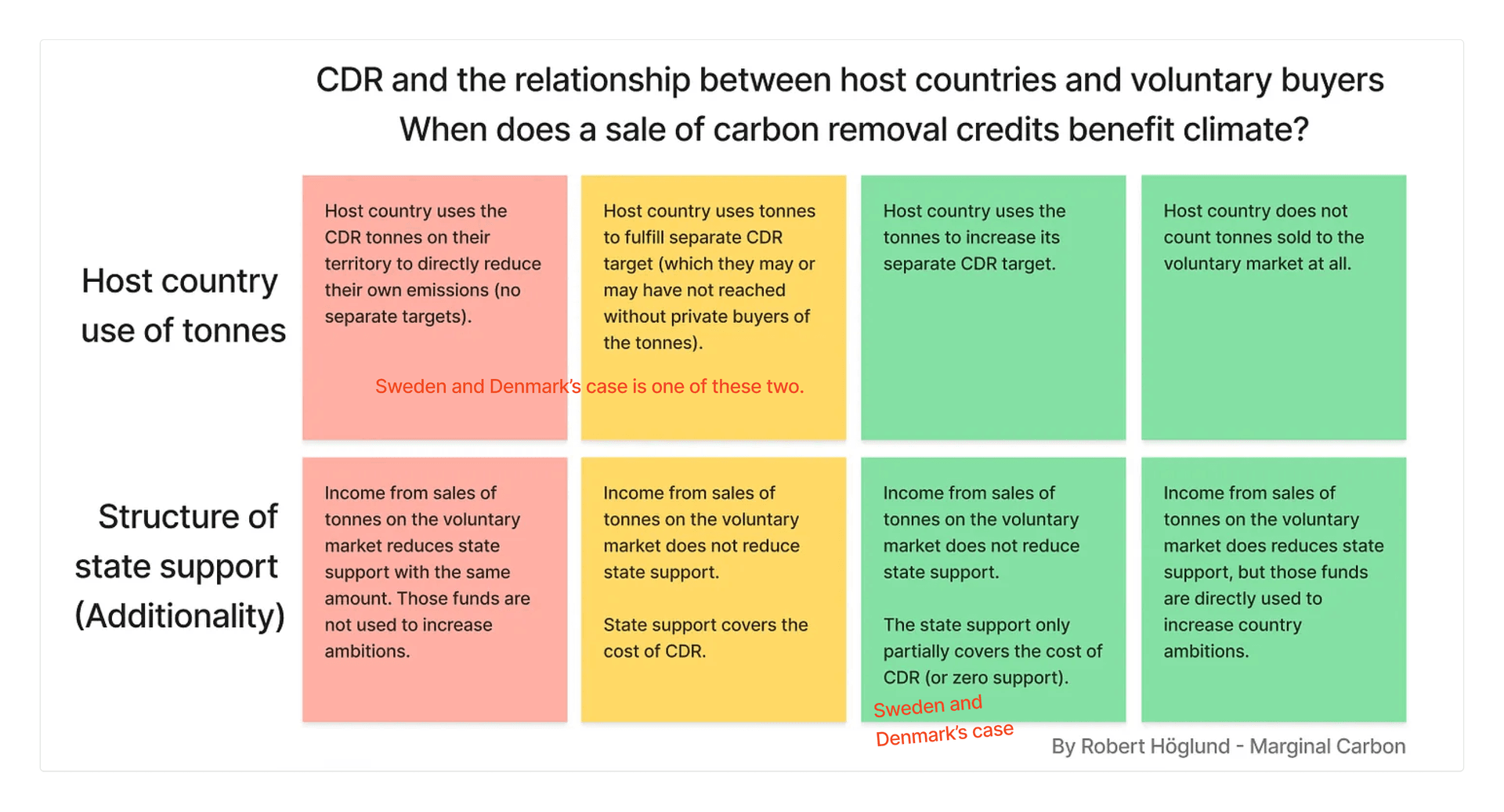August 23, 2024
Details on Sweden's BECCS Support - What will be the effect on climate?

A post by Robert Höglund
This week Sweden officially launched its long-awaited reverse auction system for Bioenergy Carbon Capture and Storage (BECCS), allowing potential BECCS providers to bid for government contracts. The Swedish government has allocated 36 billion SEK ($3,4b) for the program for delivery over 15 years. This is similar to the support Denmark has given to three biogas CO₂ separation suppliers and Ørsted’s BECCS project worth 16 billion DKK ($2,3b).
How many tonnes removed will this mean? The Energy agency indicates that the target is 2 million tonnes per year, 30 million in total. This would mean a lower level of financial support per tonne than Denmark has given per tonne. Denmark’s Energy Agency contracted “at least” 8 million tonnes from Ørsted, over 20 years, using “approximately half” of the $2,3 billion budget allocated, indicating that the state support per tonne given was around $143. Sweden's budget would be enough for around 24 million tonnes if the level of support is the same. Regardless, the total amount of tonnes sought indicates that more than one supplier likely will win the auction. The most mature BECCS player in Sweden, Stockholm Exergi, has the capacity to remove 800,000 tonnes per year meaning 12 million tonnes over the 15-year contract period.
The cost per tonne of CO₂ captured with BECCS in Sweden is estimated to be 48–135 $/tCO2 plus transport and storage. Actual costs for CO₂ storage outside Norway is not public but is rumored to be much higher than initially estimated. All in all, transport and storage costs are set to exceed the cost of CO₂ capture, very likely putting the total cost per tonne well over $200.
This means Swedish suppliers would need other sources of income to cover the target volumes sought. The reason Denmark’s state support was lower than the total cost is the sale of carbon credits. In Denmark, Ørsted sold 3.67 million tonnes to Microsoft for an undisclosed sum. Stockholm Exergi has secured sales of 3.33 million tonnes of CO₂ removal to Microsoft and an undisclosed volume of removals in a $49 million deal with Frontier (in addition to $195 million support from the EU innovation fund).
The Swedish Energy Agency bidding documents does not forbid companies using the credits for making claims, but stipulates that buyers of the credits must acknowledge that their purchases contribute to Sweden's national climate targets, and that they can’t be used to fulfill another country’s targets. Credit sales do not affect the government's budget for the program; rather, the Energy Agency selects projects through the auction system, prioritizing those with the lowest bids. Those who sold the most (or can credibly state that they will be able to sell) will naturally be able to offer lower bids.
This means that the more credits suppliers sell, the more tonnes Sweden’s budget can be allocated to. The credits are additional. But it is not certain that the sale of credits benefits the climate as this depends on how Sweden uses the tonnes. If they use the BECCS tonnes to do less on reducing other emissions, such as lowering the price of fossil fuels at the pump, the sale of credits may not contribute to less CO₂ in the atmosphere. I wrote about these complex considerations a year ago. The graph below, from that post, describes how a sale of credits may or may not benefit the climate.

The EU does not allow CDR to cover the 2030 NDC but Sweden has lobbied for this to change. The Swedish government has also removed an obligation to mix in biofuels at the pump, lowering gas prices, and is discussing lowering the aviation tax. There is some risk that CDR credit sales lower government ambitions, but there is also the possibility that CDR credit sales will be what enables Sweden to hit its targets. In situations like these, analysing if a credit sale benefits the climate or not is unfortunately a difficult exercise depending on counterfactuals. The government agency Fossil Free Sweden recommends the government abstain from using the credits in fulfilling its 2030 target, which would make credit sales more clearly positive.
Additionally, BECCS has faced criticism from environmental groups due to concerns about large-scale deployments leading to unsustainable land use practices. These concerns focus on scenarios involving purpose-grown biomass for BECCS, or increased demand for biomass. It is worth noting that Sweden already produce approximately 50 million tonnes of biogenic CO₂ emissions annually, primarily from paper and pulp mills and biomass power plants. Capturing this CO₂ does not require new biomass sourcing.
For more information, the original documents and further details on the Swedish BECCS program can be found here.
Opinions expressed are the author's own.
[Cover image raphic elements - Stockholm Exergi]